目录
- 一. 🦁 前言
- 二. 🦁 Spring-boot starter 原理实现分析
-
- 2.1 自动配置原理
- 三. 🦁 操作实践
-
- 3.1 项目场景
- 3.2 搭建项目
- 3.3 添加相关依赖
- 3.4 删除一些不需要的东西
- 3.5 发邮件工具类逻辑编写
- 3.6 创建相关配置类
- 3.7 创建 Spring.factories 文件
- 3.8 目录结构展示
- 3.9 打包
- 四. 🦁 测试使用
- 五. 🦁 总结

一. 🦁 前言
Springboot starter是SpringBoot的一个重要概念,是“一站式服务 (one-stop)”的依赖 Jar 包包含 Spring 以及相关技术(比如 Redis)的所有依赖提供了自动配置的功能,开箱即用提供了良好的依赖管理,避免了包遗漏、版本冲突等问题。
简单来说, Springboot starter 提供了一种自动配置的机制,我们只需要将需要的Starter引入项目中,它就会自动为我们配置相关的依赖和配置。这使得开发人员可以更加关注业务逻辑的实现;现在我们来学习一下它的原理,以便后面能更清晰地实现。
二. 🦁 Spring-boot starter 原理实现分析
2.1 自动配置原理
在此之前,我们主要先来了解自动配置原理。
- 首先,我们可以把Springboot的启动流程简化成以下几步:
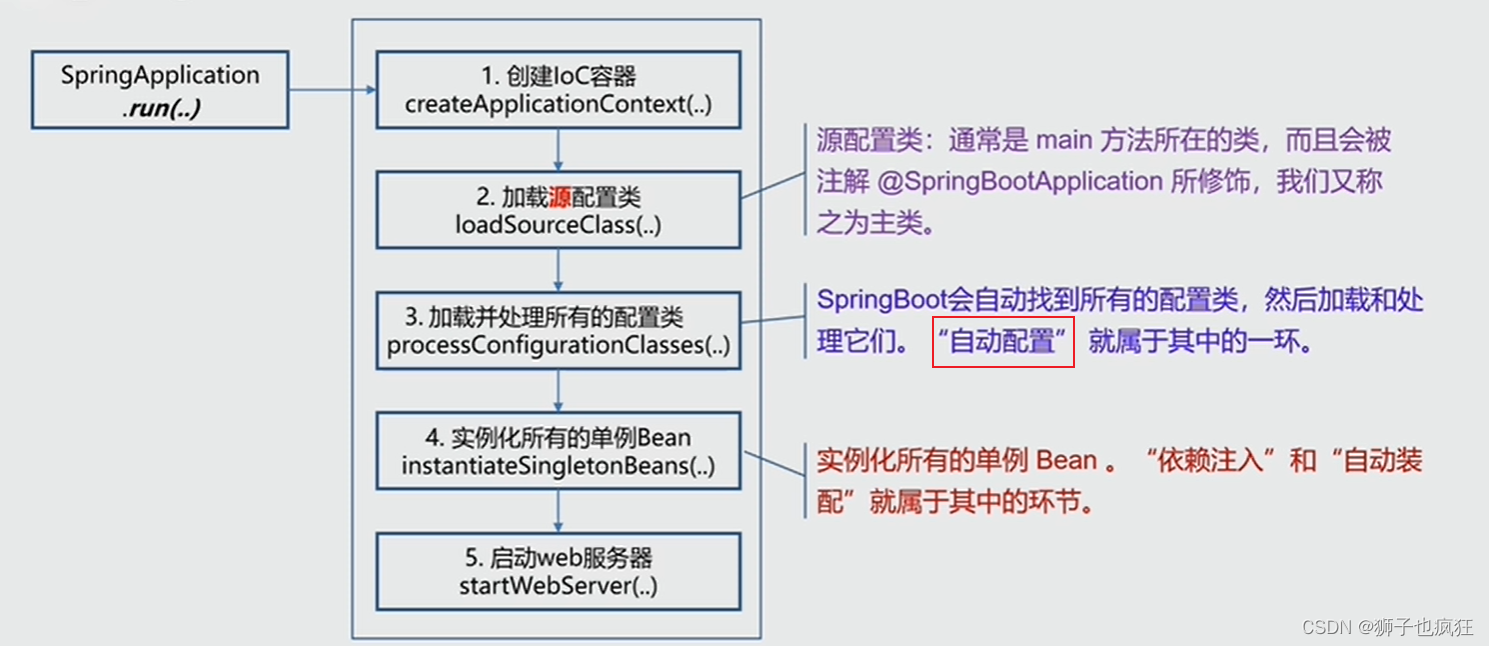
在第3步加载处理所有配置类,其处理流程如下:
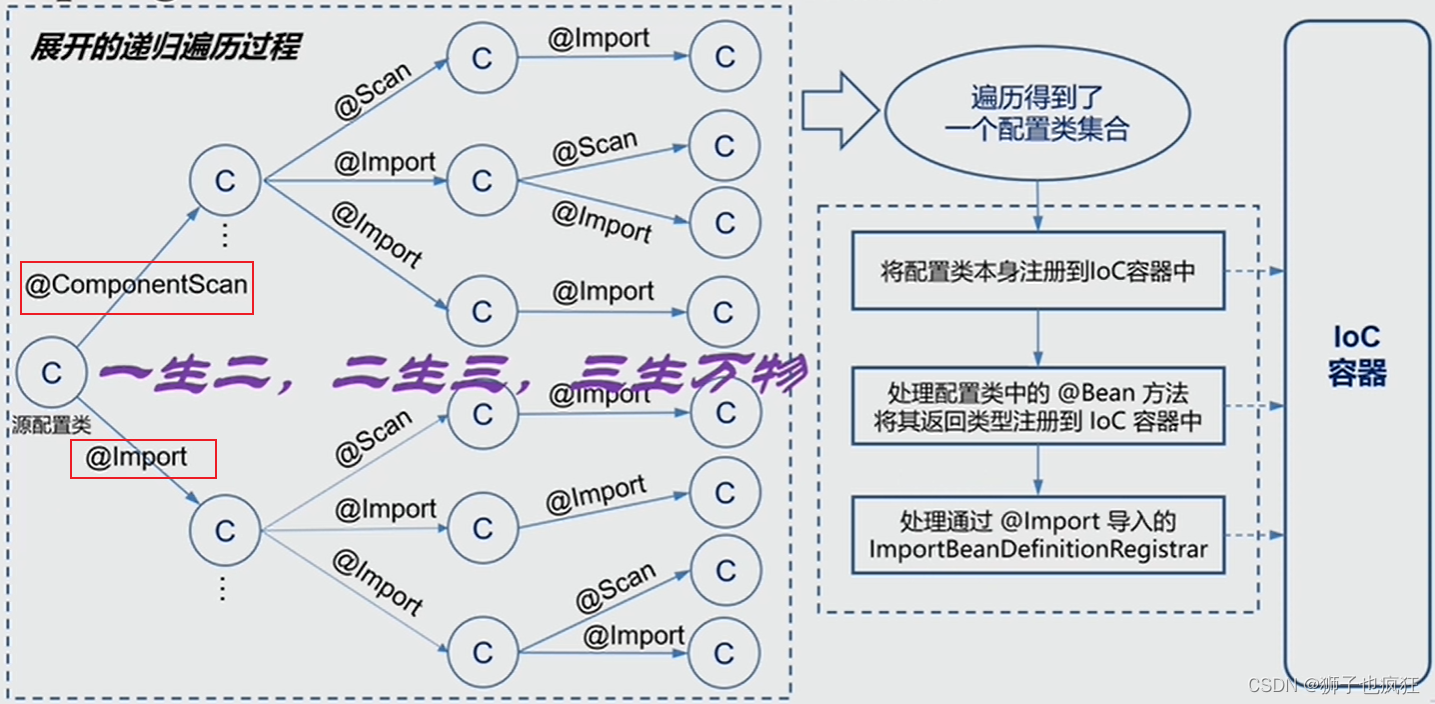
由上图可知道,加载配置类主要由两个注解完成,一个是@ComponentScan和@Import注解完成。
其中,@ComponentScan其实就是@SpringbootApplication里面的注解之一,其作用是为了扫描其同级或者子包下的配置类(即与启动类同级或者子包下的配置类,这也是为啥我们做项目的时候,只需要导入一个starter就能实现某功能,其余工作都是Springboot帮我们干了),
而 @Import 注解则在@EnableAutoConfiguration注解(其作用之一就是为了开启自动配置功能)里面,通过导入一个选择器ImportSelector的方式,提供了一种显式地从其它地方加载配置类的方式,这样可以避免使用性能较差的组件扫描(Component Scan)。
那么以上哪种注解适合用来实现自动配置呢?
无疑是使用导入选择器ImportSelector的@Import注解适合加载第三方jar包导入;
回到 @SpringbootApplication 注解,其注解组成如下:
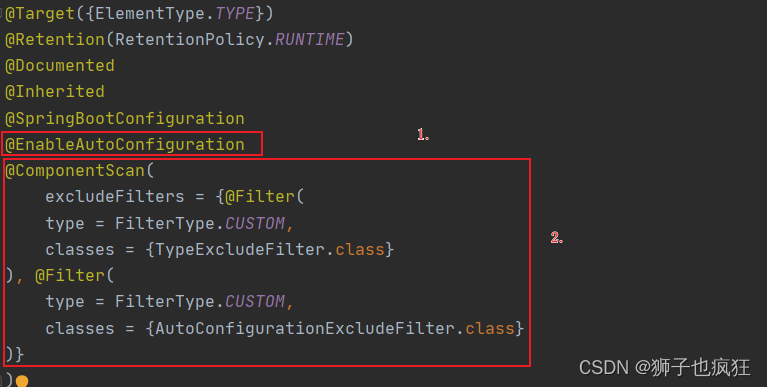
而@EnableAutoConfiguration则是开启自动配置的核心注解,它由以下注解组成:

它通过导入AutoConfigurationImportSelector.class来实现自动配置;
而AutoConfigurationImportSelector类则是基于SpringFactories机制来实现的,现在来看一下它的主要源码:

getAutoConfigurationEntry(annotationMetadata)方法如下:

我们主要来看一下getCandidateConfigurations(annotationMetadata, attributes)方法:
protected ListString> getCandidateConfigurations(AnnotationMetadata metadata, AnnotationAttributes attributes) {
ListString> configurations = new ArrayList(SpringFactoriesLoader.loadFactoryNames(this.getSpringFactoriesLoaderFactoryClass(), this.getBeanClassLoader()));
ImportCandidates.load(AutoConfiguration.class, this.getBeanClassLoader()).forEach(configurations::add);
Assert.notEmpty(configurations, "No auto configuration classes found in META-INF/spring.factories nor in META-INF/spring/org.springframework.boot.autoconfigure.AutoConfiguration.imports. If you are using a custom packaging, make sure that file is correct.");
return configurations;
}
这个则是基于SpringFactories机制获得第三方jar包中所有自动配置类的方法。由代码可以知道,读取配置文件获取自动配置类时,使用的key是类EnableAutoConfiguration的全限定名。其主要流程如下:
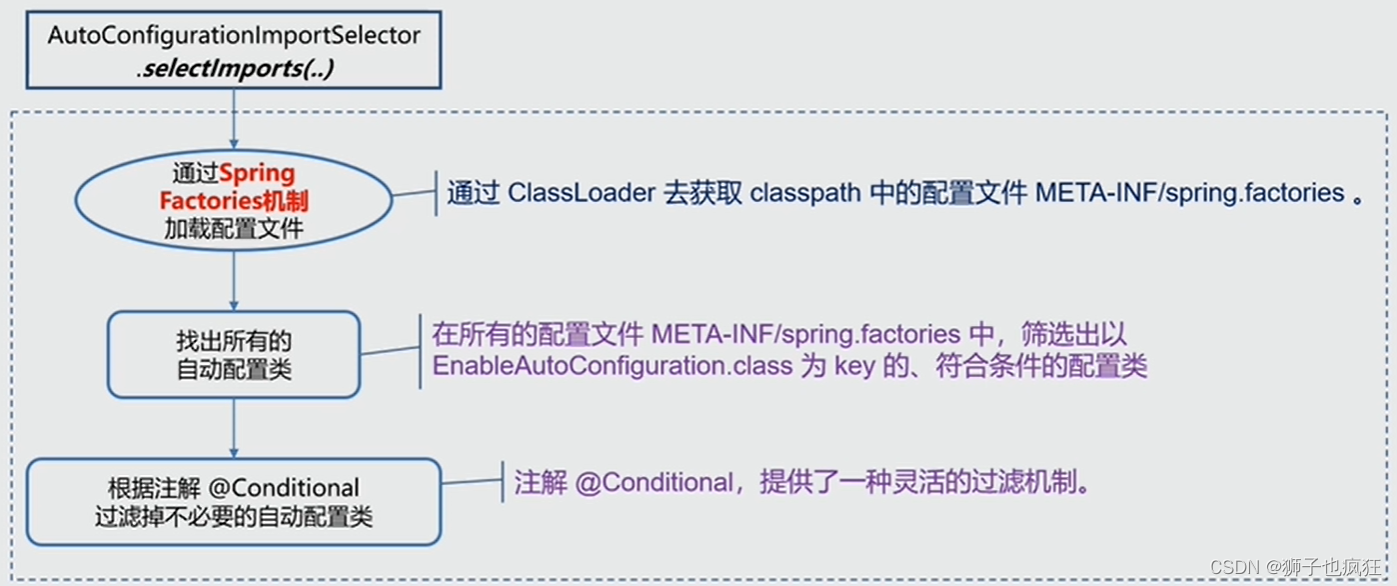
最后总结一下:
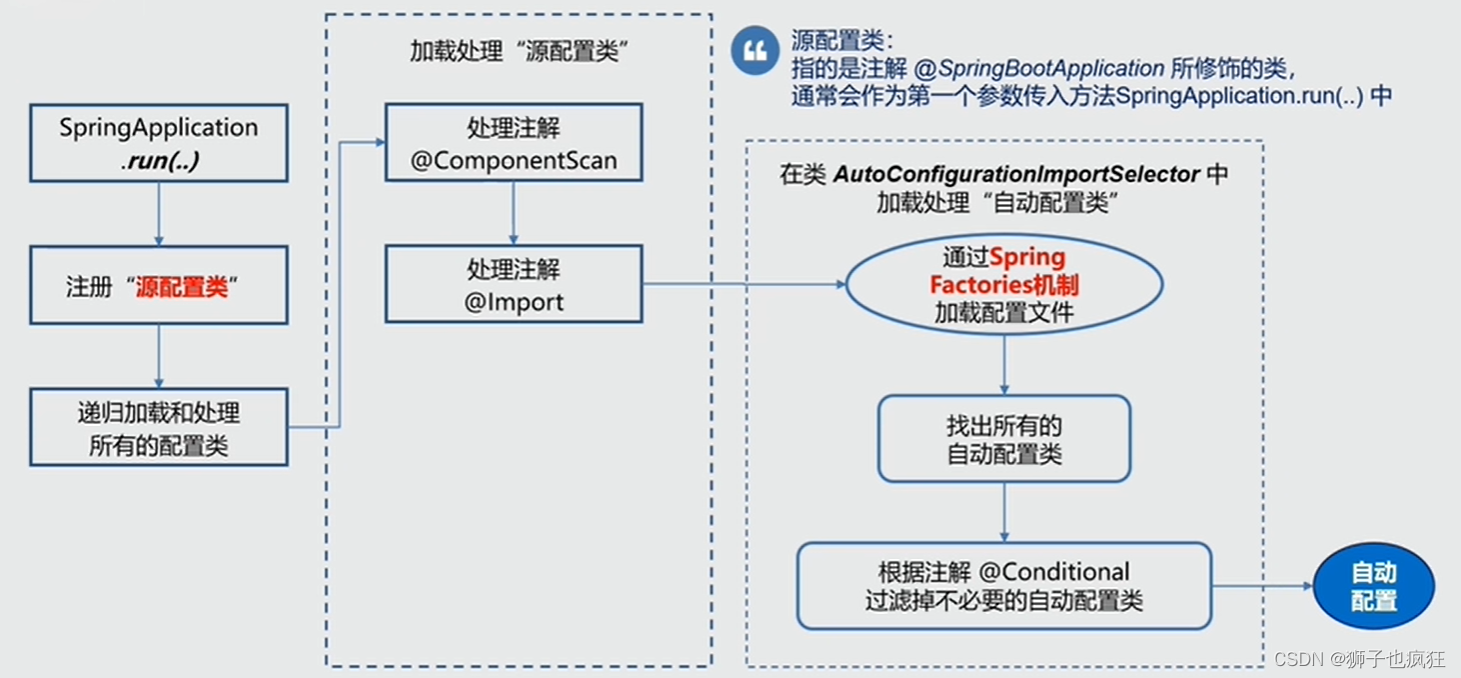
这里狮子是学习了B站一个UP主的视频理解的,推荐给大家:码场安员外
三. 🦁 操作实践
3.1 项目场景
前面狮子写了一篇《【SpringBoot】| 邮箱发送验证码,你会了吗?》深受伙伴们捧场,今天我们基于这个基础上再来封装一下spring-boot-starter-mail发送邮件类型的starter,方便后续使用。
3.2 搭建项目
我们先来搭建一个Springboot项目;根据Springboot starter的命名规范,属于Spring官方的就以spring-boot-starter-xxx的形式命名,其他技术自动整合Springboot的则按照xxx-spring-boot-starter命名。现在狮子起名为lion-email-spring-boot-starter,提高识别度(很规范(bushi),如下:
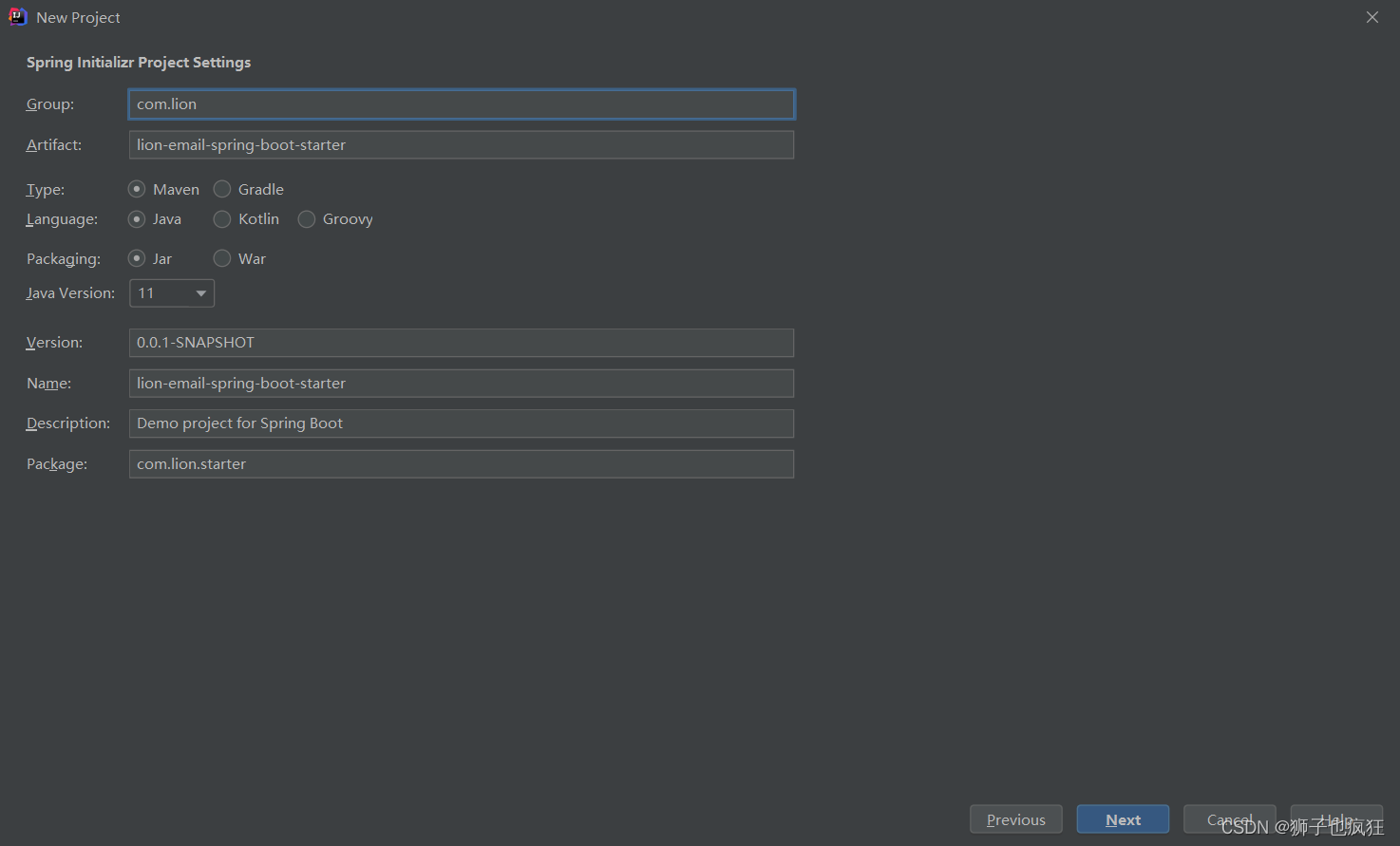
3.3 添加相关依赖
先添加Lombok、spring-boot-starter-mail Spring Confguration Processor依赖(很重要,后面会体现它的价值);
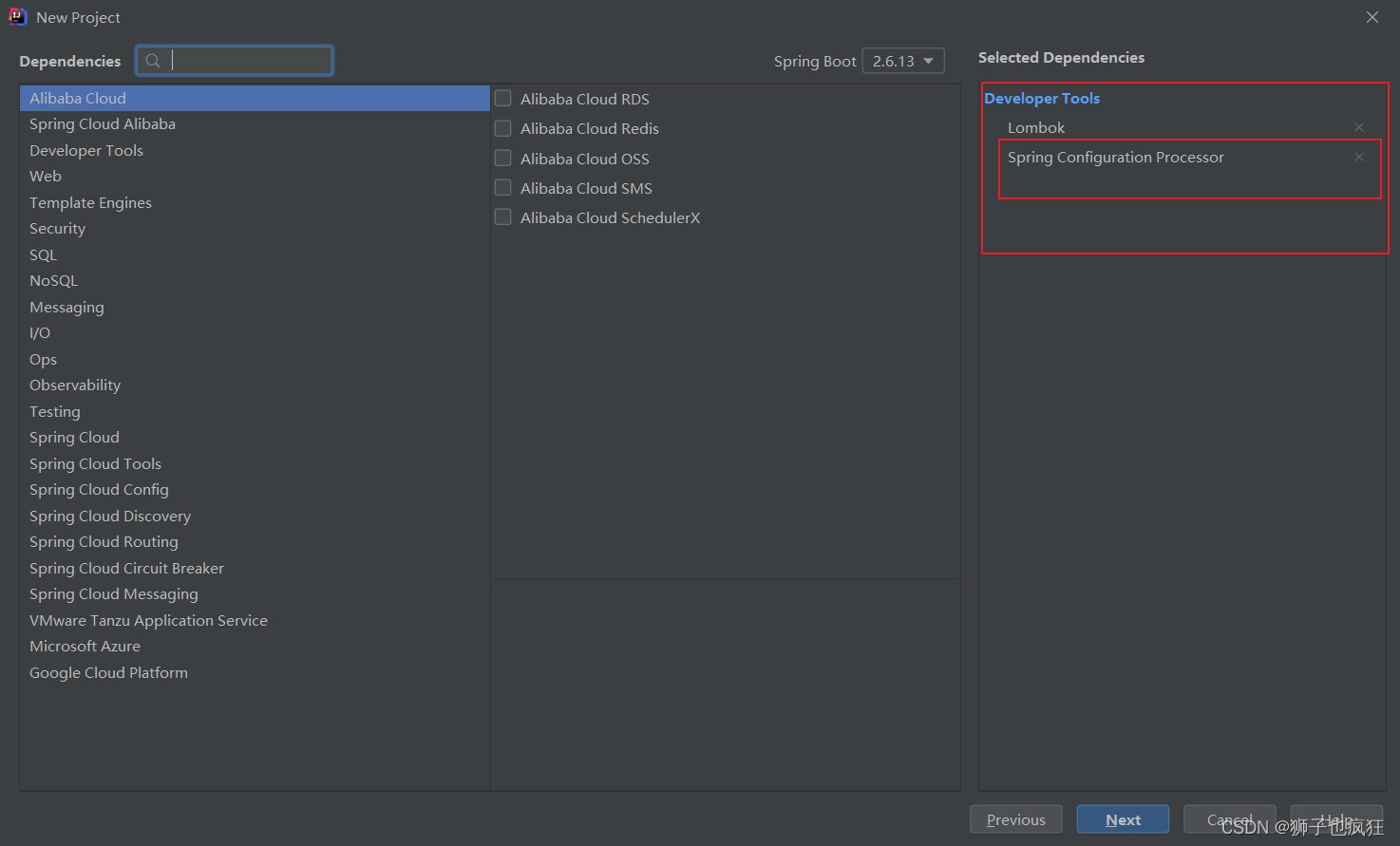
3.4 删除一些不需要的东西
- 测试依赖

- 打包插件
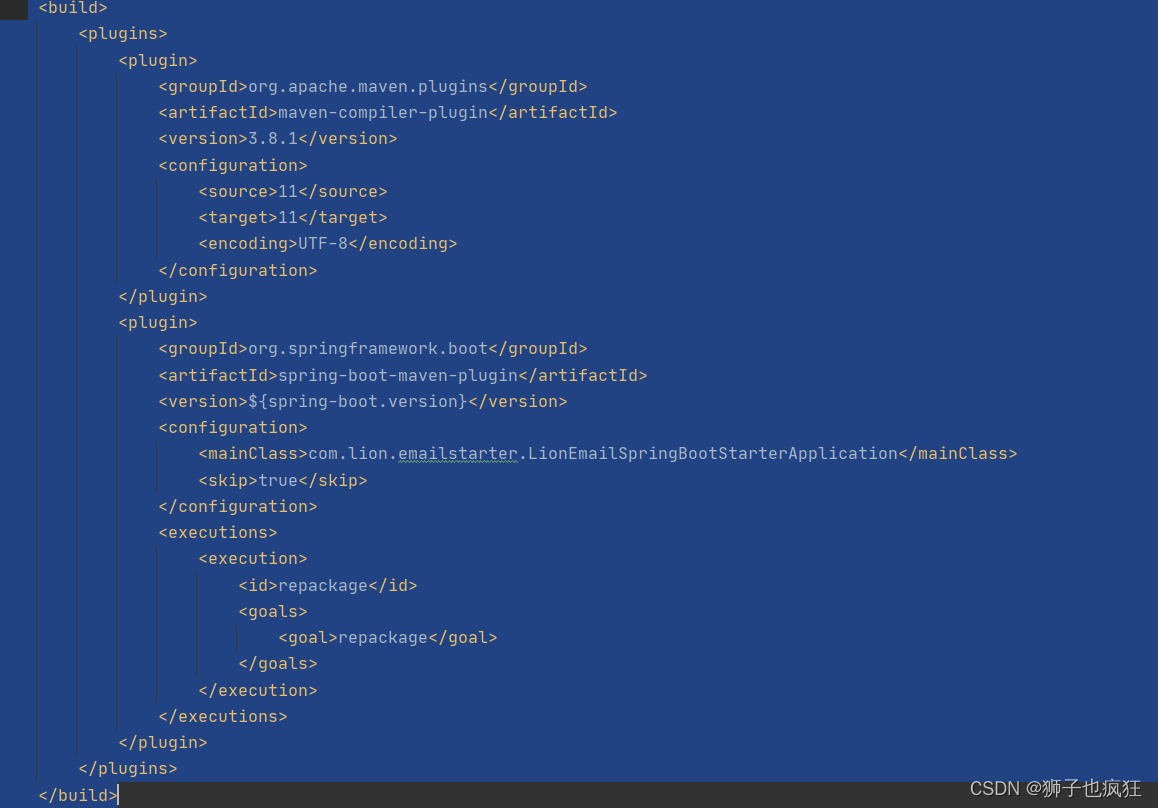
- 启动类
启动类也用不着,可以删了;
3.5 发邮件工具类逻辑编写
这种工具类写法比较固定,并不需要去记忆,自己积累一个就好。
import lombok.AllArgsConstructor;
import lombok.Data;
import org.springframework.stereotype.Component;
import javax.mail.*;
import javax.mail.internet.InternetAddress;
import javax.mail.internet.MimeMessage;
import java.util.Properties;
/**
* 发邮件工具类
*/
@Data
@AllArgsConstructor
public final class MailUtils {
private String USER; // 发件人邮箱地址
private String PASSWORD; // 如果是qq邮箱可以使户端授权码
/**
* 发送邮件
* @param to 收件人邮箱
* @param text 邮件正文
* @param title 标题
*/
public boolean sendMail(String to, String text, String title){
try {
final Properties props = new Properties();
props.put("mail.smtp.auth", "true");
props.put("mail.smtp.host", "smtp.qq.com");
// 发件人的账号
props.put("mail.user", USER);
//发件人的密码
props.put("mail.password", PASSWORD);
// 构建授权信息,用于进行SMTP进行身份验证
Authenticator authenticator = new Authenticator() {
@Override
protected PasswordAuthentication getPasswordAuthentication() {
// 用户名、密码
String userName = props.getProperty("mail.user");
String password = props.getProperty("mail.password");
return new PasswordAuthentication(userName, password);
}
};
// 使用环境属性和授权信息,创建邮件会话
Session mailSession = Session.getInstance(props, authenticator);
// 创建邮件消息
MimeMessage message = new MimeMessage(mailSession);
// 设置发件人
String username = props.getProperty("mail.user");
InternetAddress form = new InternetAddress(username);
message.setFrom(form);
// 设置收件人
InternetAddress toAddress = new InternetAddress(to);
message.setRecipient(Message.RecipientType.TO, toAddress);
// 设置邮件标题
message.setSubject(title);
// 设置邮件的内容体
message.setContent(text, "text/html;charset=UTF-8");
// 发送邮件
Transport.send(message);
return true;
}catch (Exception e){
e.printStackTrace();
}
return false;
}
}
3.6 创建相关配置类
创建LionEmailConfig配置类,在这里面干两个事:
一是在配置类里实例化MailUtils类,并将邮箱地址以及授权码返回给mailUtils;
二是配置参数:一般配置参数都是在Spring Boot 的application.yml中。我们会定义一个前缀标识来作为名称空间隔离各个组件的参数。对应的组件会定义一个XXXProperties 来自动装配这些参数。自动装配的机制基于@ConfigurationProperties注解,请注意一定要显式声明你配置的前缀标识(prefix)。
这里需要添加几个注解,如下:
- @Configuration:在这里进行自动配置的工作。可以使用条件注解(@ConditionalOnClass、@ConditionalOnProperty 等)来根据情况决定是否应用自动配置。
- @ConfigurationProperties(“lion.email”):用于将外部配置属性绑定到 Spring Boot 应用程序中的 Java 对象上。这里加了一个lion.email前缀,则表示在配置文件(例如yaml文件)中,lion.email前缀下的字段值都会加载到Java对象中。
import com.lion.emailstarter.utils.MailUtils;
import lombok.Data;
import org.springframework.boot.context.properties.ConfigurationProperties;
import org.springframework.context.annotation.ComponentScan;
import org.springframework.context.annotation.Configuration;
@Configuration
@ConfigurationProperties("lion.email")
@ComponentScan
@Data
public class LionEmailConfig {
private String user = "2373489842@qq.com"; // 发件人邮箱地址
private String password = "abc-kpi"; // 如果是qq邮箱可以使户端授权码
@Bean
public MailUtils mailUtils(){
return new MailUtils(user,password);
}
}
3.7 创建 Spring.factories 文件
- 在 src/main/resources 目录下,创建一个名为 META-INF/spring.factories 的文件。

- 文件里面的内容为(写法很单一,cv即可):
# spring boot starter
org.springframework.boot.autoconfigure.EnableAutoConfiguration=com.lion.emailstarter.LionEmailConfig
3.8 目录结构展示
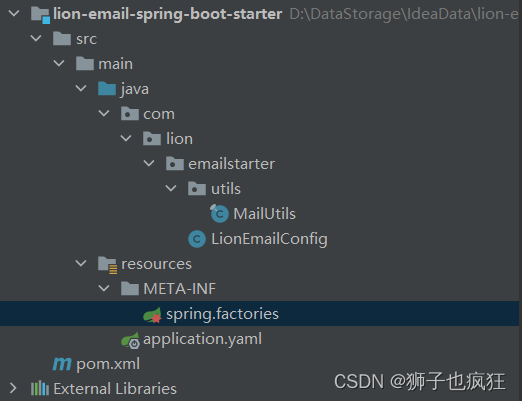
3.9 打包
如下:
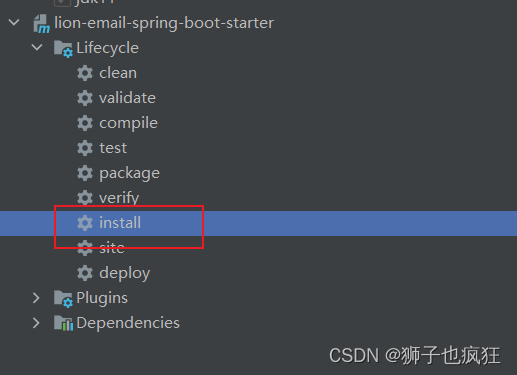

显示成功则说明该starter已经打包到本地的版本库中,starter编写完成。
四. 🦁 测试使用
随便找一个SpringBoot项目,
- 导入刚刚创建好的
lion-email-spring-boot-starter依赖
dependency>
groupId>com.liongroupId>
artifactId>lion-email-spring-boot-starterartifactId>
version>0.0.1-SNAPSHOTversion>
dependency>
- 参数编写
我们在yaml文件编写相关参数:
当我们输入lion的时候就会弹出相关提示,这是因为前面3.3节我们添加了Spring Confguration Processor的缘故,自动生成配置的代码提示。

- 测试
@SpringBootTest
class LionTelecomsApplicationTests {
@Autowired
private MailUtils mailUtils;
@Test
void contextLoads() {
mailUtils.sendMail("2373489842@qq.com","有内鬼, 终止交易!","测试starter");
}
}
- 测试结果
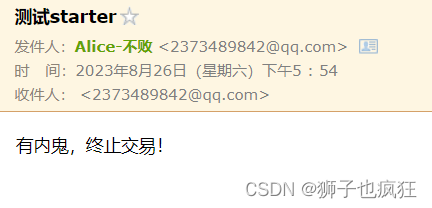
五. 🦁 总结
这个技能对你有用么??有用点个赞,咱们下期见!

🦁 其它优质专栏推荐 🦁
🌟《Java核心系列(修炼内功,无上心法)》: 主要是JDK源码的核心讲解,几乎每篇文章都过万字,让你详细掌握每一个知识点!
🌟 《SpringBoot 源码剥析核心系列》:一些场景的Springboot源码剥析以及常用Springboot相关知识点解读
欢迎加入狮子的社区:『Lion-编程进阶之路』,日常收录优质好文
更多文章可持续关注上方🦁的博客,2023咱们顶峰相见!


